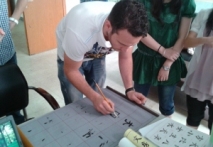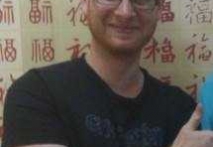Latest News
- Wuxi's Nanchang Street--a historic cultural district that combines classical charm, delicious food, and fun activities
- chinese study
- lastest courses
- Business Assistance/International Consortium of Stem Cell Research
- Foreigner's view of Jiangsu -Changzhou Jintan starts
- estimonials for Our new French Internship student Anais 企业表扬信
- The Double Seventh Festival in China Introduction
- Chinese Proficiency Test (HSK)
- China University Mining and Technology
- Wuxi Library
Students Say
Mandarin Student Zack
Mandarin Education School is a great place to learn Chinese and Chinese Culture.I've learned a lot in this school, my Chine...
Learn Chinese Travel China
If you want to learn Chinese and also discover China, Mandarin Education organize the most funny and cultural study tour.
The...
suzhou Mandarin Jude
I am Jude, I am learning Mandarin in Suzhou Mandarin School,I was learning in Wuxi Mandarin Education too.I like my Chinse Teacher...
chinese class
Improve your reading, speaking and your writing by experiencing our teaching methods,Offer free student Visa.
...
Wuxi Mandarin Jessie
I've learned Chinese for almost 8 years, I can understand what Chinese people say,but when I speak, I feel very uncomfor...
Chinese Internship or Jobs
You are looking for a professional experience abroad? Get the opportunity to discover the Chinese business,Look for an ...
Mandarinedu Student Florent
I love my Wuxi Mandarin Education School. It is the EASY MANDARIN Learning way, I am learning faster than I wanted.My teach...
Mandarin E Learning
Mandarin Education School offers you Online Chinese Courses. It has never been so easier to have Chinese courses ...
Mandarin Student Brad
I am studying Chinese in Mandarin Education School. I can speak quit good Chinese and talk to Chinese people by myself. Thank...
Wuxi Mandarin edu. Student Jennifer
I love learning Chinese in Mandarin Education School.That's a great place to learn and make friends.
...
Add Our School Official
to get more informations

0086 1866 1199 988
0086 510-81151808
Sandy.Swun
519988808
Mandarin Education School
Room 405, 4 Fl,Building No.8,
Maoye Business Center,
Chang jiang No.1,
New district , Wuxi City , China
This blog is an introduction to what will be a subsequent three-part series. Each draw on my and my partner’s (Nicola) experiences of getting things done in China as westerners.
We do not claim to be experts on China. We have however been in China for over a year working closely with the Chinese seeking to get things done collaboratively with them. The blogs are based on those practical experiences. It is acknowledged that there is a large and growing literature on ‘culture differences’. Much of this is helpful. Our interest is however more practical. Not simply understanding differences and what they are, but getting things done given those differences. It is one thing for example to know that the traditional Chinese formal meetings involve you sitting at one end of a table in conversation with the Chinese leader at the other end with those in between keeping silent. It is quite another to know how to deal with those situations appropriately as a westerner given our more inclusive and open meeting traditions. The hope is that those who read these blogs will share their experiences of getting things done in China and in so doing build together a more comprehensive wisdom of practical ‘know how’.
The blogs are concerned with a dilemma central to getting things done in China. It can be expressed as follows:
1) Many westerners experience working in China as fraught with difficulty and high on frustration. An experienced Managing Director in telecommunications with long experience as an ex-patriate expressed his bewilderment at how anyone got anything done in China given the bureaucracy. Another European Managing Director of a western company with outsourced manufacturing operations in China expressed it differently: “The Chinese don’t listen”; “Even when you think they’ve listened, they go off and do something different”; “They don’t think”; “If you tell them off you are accused of not respecting them”; “They’ll tell you one thing and do another”; “Everything here is chaotic”.
2) By contrast the Chinese have done some brilliant things, typically not acknowledged in the largely negative western press. Most westerners know about the Chinese economic performance and the miraculous transformation into an economic powerhouse in the blink of an eye. Some have travelled on the bullet trains and experienced the modern cities the Chinese have built or the model villages they have created in the poorer rural areas. A few may be aware of the brilliant achievements of the Chinese in the field of education. World number 1 school as acknowledged by the OECD is in mainland China: in Shanghai. That also has been achieved in the blink of an eye. These are not the creations of people who don’t think or get things done.
The central tenet of these blogs is that the Chinese do get things done, but in a different way. Many times, we experienced things suddenly coming together at the last minute as if by magic. Our metaphor became that of the dance. As westerners we dance the waltz. We are familiar with this. It is ingrained in us. We know the steps and how to put them together. We trust them as a means of performing our dance. We have spent a lifetime developing and perfecting them. They work. We import them with us as we come to China through the ‘nothing to declare’ channel. And then when we get here we find our partners are dancing a different dance the steps of which are unknown to us. Unfamiliar and strange. Culture differences or culture shock are good anesthetic words for this experience. It can even be articulated in more analytic terms using Kahane’s three dimensions of complexity (Kahane 2000) as getting things done in situations where we experience a considerable diversity of actors with divergent purposes, when the future is unpredictable and when it is almost impossible to ‘know’ the outcomes of one’s actions. But none of this fully accounts for the bewilderment, angst and anxiety experienced as a result – particularly as the deadlines for getting things done loom over the horizon and the pressure is on. Chris’s story of the ‘ee why’ (spelt as pronounced) became our way of describing this.
The Story of Chris’s ‘Ee-why’
An ‘ee why’ is the Chinese word for a surprise. Not necessarily pleasant since there is another Chinese word for a pleasant surprise. You can’t go far as a westerner trying to get things done in China without experiencing the abundance of these ‘ee whys’. They signify that everything has suddenly changed and what you thought was going to happen isn’t, usually for unknown reasons. We developed a sort of humor as westerners to cope with this along the lines ‘Jupiter has moved into Aries’.
Chris is from Ireland. An experienced teacher who came to China to teach English within the Chinese school system. He had the offer of a paid job – but to secure it he had to give a demonstration lesson, observed by the key decision makers in the school, including the Head. He was told at 9.00 o’clock at night that he would be teaching an advanced class of 17-year-olds at 10.00 a.m. next morning. He was up half the night given his future depended on this performance. He produced a detailed lesson plan, made easier by his previous teaching experience with older children, and finally satisfied with it went to bed. Next morning, 8.30 a.m. – ee why – a phone call: you are on in half an hour – with complete beginners. No reason given. Chris was furious. Imagine his frustration. His polished plan was useless. He did the best he could in his demonstration lesson but was uneasy and anxious delivering an unprepared lesson to an unfamiliar age group in front of key decision makers whose body language he could not read when so much depended upon it for him personally. He got the job, but after subsequently experiencing a whole series of such ee-whys on an almost daily basis packed his bags and returned to Ireland. We found out subsequently that the school needed an additional foreign teacher to gain funding from the authorities. Chris was the only applicant. It was a ‘show trial’ rather than a selection. This only added to Chris’s anger and frustration – ‘What, I have been through all this for nothing?’
The Chinese got things done. They got the teacher they needed. They ‘ticked the box’ for the release of budget funds. But at what emotional cost to Chris?
‘Ee whys’ happen frequently in China much to the frustration of many westerners. You can’t avoid them, and the issue becomes how to deal with them. Faced with frustration and anxiety many go down the route of redoubling their efforts to plan and organize, whilst at the same time venting their frustration. Ranting about the Chinese, usually to other westerners and out of earshot of the Chinese is a good way of achieving such venting. As the European managing director referred to earlier did. This can of course work, it can get things done, particularly if you are in a position of power. But it is worth recognizing that it is nothing but a demonstration of the well-known psychodynamics and coping mechanisms for dealing with anxiety and stress: rigid task routinization to conserve our ways of getting things done (do what we normally do in the west to get things done, but do it harder, more thoroughly, better, and then it will work) and of course projection and scapegoating to account for any failure (‘The reason our ways don’t work is because the Chinese are stupid, disorganized, chaotic’). Even if they do work, the almost inevitable consequence of seeking to conserve our western mind sets in this way is the stress we in turn inflict on the Chinese as we force them to dance our dance. But all too often, particularly if you are not in a position of power (as we weren’t) it doesn’t work. The carefully re-reworked gantt chart joins the others in its only real function of propping up a wobbly table and the stress and anxiety increase. It is a vicious circle from which Chris escaped – by going home. The alternative is to stand back and ask the simple questions: How do the Chinese get things done? What can we learn from that? This demands a change in our worldviews. To stop labelling things as ‘chaos’ and to start seeing them for what I believe they are: well-orchestrated and choreographed steps in a different dance for getting things done. A dance grounded in their culture and uniquely equipped to deal better than ours with their context. In China we spent a lot of time working on cross cultural awareness. We encouraged groups of young talented Chinese and westerners to come together to share their perceptions of each other. The natural instinct of the Chinese was to say the ‘nice’ things. But as the westerners probed, other descriptors appeared. That we westerners were ‘arrogant’ and ‘selfish’. These young Chinese had a point. There is nothing more arrogant than applying our established norms to 1.4 billion people and expecting them to change to dance our dance so that we can get things done our way. And then ranting if they don’t. It is a severe case of ‘do not adjust your mind, there is a fault in reality’.
*Abstract, Author: Bill Laidlaw, Full article: https://gseresearch.wordpress.com/2012/12/06/getting-things-done-in-china/










